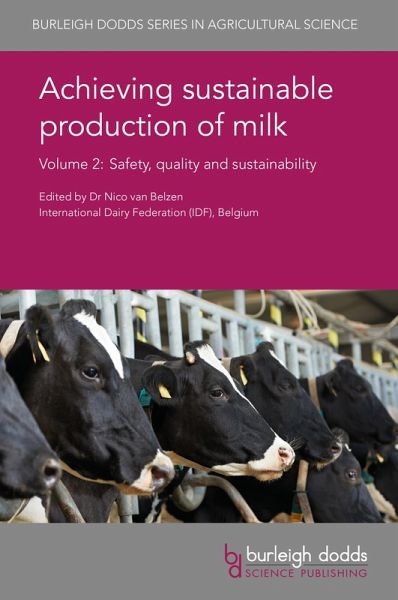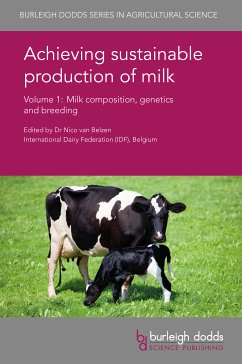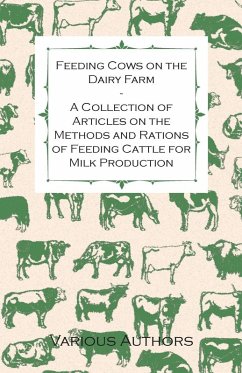
Achieving sustainable production of milk Volume 2 (eBook, ePUB)
Safety, quality and sustainability
Redaktion: Belzen, Nico van
Versandkostenfrei!
Sofort per Download lieferbar
162,95 €
inkl. MwSt.
Weitere Ausgaben:

PAYBACK Punkte
81 °P sammeln!
"All three volumes of Achieving sustainable production of milk should be considered as a whole...Over more than 1200 pages, the authors review all fields of milk production, beginning with milk composition, genetics and breeding, safety and milk quality, sustainability of milk production as well as dairy herd management, health, welfare and nutrition of dairy. All three volumes could be considered a standard reference for graduate students in the fields of dairy science and veterinary medicine, animal and dairy scientists at universities and other research centres, and also those in government...
"All three volumes of Achieving sustainable production of milk should be considered as a whole...Over more than 1200 pages, the authors review all fields of milk production, beginning with milk composition, genetics and breeding, safety and milk quality, sustainability of milk production as well as dairy herd management, health, welfare and nutrition of dairy. All three volumes could be considered a standard reference for graduate students in the fields of dairy science and veterinary medicine, animal and dairy scientists at universities and other research centres, and also those in governments and companies involved or working in the field of milk production."
Animal Feed Science and Technology
In meeting rising demand, more intensive dairying systems face a range of challenges such as maintaining high standards of safety in the face of the continuing threat from zoonoses, whilst sustaining nutritional and sensory quality. At the same time farms need to become more efficient and sustainable. Finally, farming must also meet higher standards of animal health and welfare. Smallholder systems in developing countries face problems such as poor cattle nutrition, low productivity and vulnerability to disease which impact on safety, quality, sustainability and animal welfare.
Drawing on an international range of expertise, this book reviews research addressing safety, quality and sustainability. Part 1 reviews pathogens affecting milk, their detection and control. The second part of the book discusses the environmental impact of dairy farming and ways it can be better managed, from improved nutrition to ways of protecting biodiversity. The book also reviews ways of supporting smallholders improve dairy farming in the developing world.
Achieving sustainable production of milk Volume 2: Safety, quality and sustainability will be a standard reference for animal and dairy scientists in universities, government and other research centres and companies involved in milk production. It is accompanied by two further volumes which review milk composition, genetics and breeding as well as dairy herd management and welfare.
Animal Feed Science and Technology
In meeting rising demand, more intensive dairying systems face a range of challenges such as maintaining high standards of safety in the face of the continuing threat from zoonoses, whilst sustaining nutritional and sensory quality. At the same time farms need to become more efficient and sustainable. Finally, farming must also meet higher standards of animal health and welfare. Smallholder systems in developing countries face problems such as poor cattle nutrition, low productivity and vulnerability to disease which impact on safety, quality, sustainability and animal welfare.
Drawing on an international range of expertise, this book reviews research addressing safety, quality and sustainability. Part 1 reviews pathogens affecting milk, their detection and control. The second part of the book discusses the environmental impact of dairy farming and ways it can be better managed, from improved nutrition to ways of protecting biodiversity. The book also reviews ways of supporting smallholders improve dairy farming in the developing world.
Achieving sustainable production of milk Volume 2: Safety, quality and sustainability will be a standard reference for animal and dairy scientists in universities, government and other research centres and companies involved in milk production. It is accompanied by two further volumes which review milk composition, genetics and breeding as well as dairy herd management and welfare.
Dieser Download kann aus rechtlichen Gründen nur mit Rechnungsadresse in A, D ausgeliefert werden.













